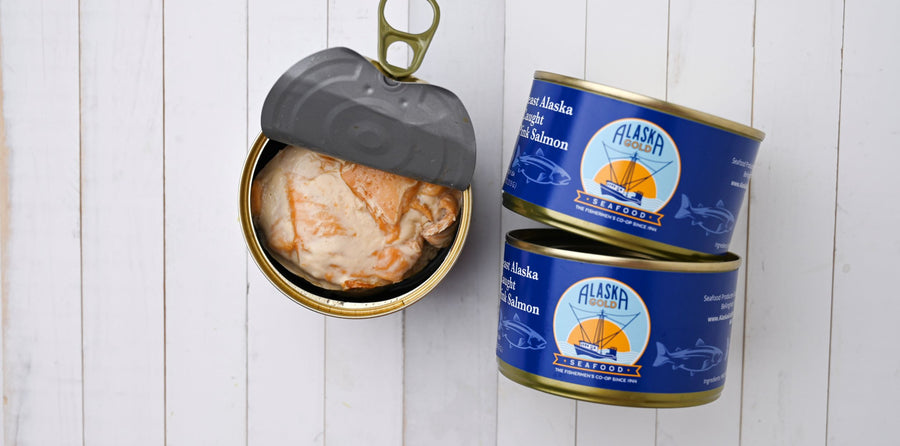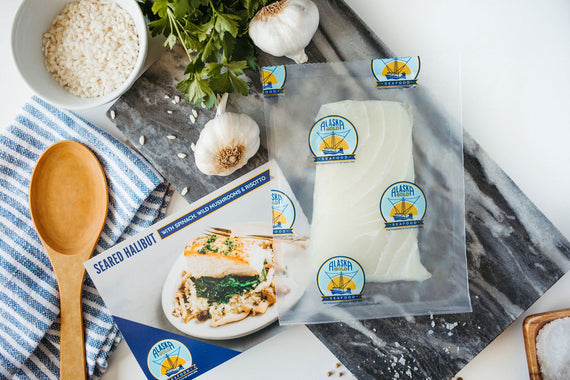
Many customers ask why there is no expiration date on the canned salmon and canned tuna they ordered from Alaska Gold Seafood.
We have a wise and witty customer who asked this question and we gave him our standard response that when stored in a cool, dark pantry you can enjoy that canned salmon or canned tuna many years, even decades from date of purchase. This customer called back a few weeks later and said, “You were wrong. This canned tuna did not last very long at our house. We need to order more!” And it’s true—you can rest assured knowing that our canned salmon and canned tuna is of exceptional quality, and you’ll want to be ordering more.
We do not put on an expiration date because kept in a cool, dark pantry, our canned salmon and canned tuna will be good for years. It will be ready when you are to be enjoyed when you’re out and about or just want a simple meal at home without having to cook.
We do have a code on the bottom of the can that indicates date that it was canned and the boat it was caught on, but it’s a code for our use.
Another commonly asked question about our canned tuna and canned salmon is if it’s packed in oil or water. Neither! Please note that our canned seafood items are hand-packed in their own juices and oils with absolutely no additional oil or water. There is no reason to add oil or water—there are plenty of natural heart-healthy oils in the tuna and salmon themselves. If you want extra oil, add your own olive oil when you’re ready to make a dish with the canned seafood.
A good rule of thumb for canned seafood, such as canned salmon or canned tuna, is that it can be safely kept in a cool dark pantry for 5 years. But really, as long as the seal remains unbroken, a tin can last nearly indefinitely. We recommend avoiding exposure to extreme temperature fluctuations, so kept indoors in a pantry is best. Please do not leave somewhere like an unheated garage or a storage shed. We highly recommend bringing our canned salmon and canned tuna on day hikes and overnight outdoor campouts! Once a can is opened, transfer any uneaten canned goods into an airtight container (to prevent them from drying out too much) and you should be able to keep them in the fridge for 3 days or so.
Our friend The Sardinfluencer has a few pearls of wisdom for storing canned seafood:
“Like many foods, the expiration date is more of a suggestion than a hard and fast rule, but when it comes to canned foods in particular.” In a somewhat fishy tale, Harrison at The Sardinfluencer recounts that “in 1856 the Steamboat Arabia sank while sailing up the Missouri River, carrying foodstuffs for 16 towns. Settling beneath the silty bottom, the ship (and its many cases of preserved foods) remained untouched until it was raised from the mud in 1987. Incredibly, when tested, the 132-year-old jars of pickles, meats, and fruits showed zero signs of microbial life.”
It's also true that fanatics of canned items and even food producers themselves are intentionally aging tins, and after many years, their contents can take on richer, more complex flavors and textures. Like wine, the flavor of canned seafood can get more complex and interesting, but still just as safe.
In addition to storing in a cool, dark place, one other suggestion is to make sure that before cracking, make sure there is no outward air pressure inside. if the lid is "bubbled" up and can be pressed down, avoid eating.
Expiration Date on Frozen Seafood
Another note is that we do not put expiration dates on our frozen seafood because putting an expiration date on frozen seafood is rather arbitrary. This answers the question: When is the best season to eat Alaska seafood? Other factors having a much greater impact on quality and food safety than how long seafood has been frozen for are: How was the fish handled on the fishermen’s boat? Did they clean it well before storage, removing viscera and blood? How quickly was the fish put on ice or blast frozen? Were the processors cutting the fish using good manufacturing practices? How thick is the material used to vacuum seal the fish? Was a good vacuum seal achieved? All of these factors are much more important to the quality and safety of a fish than how long it has been frozen for. In your home freezer, you will not want to store the fish for much longer than 6 months. We recommend 3 months unless you are using a deep freeze set at its coldest setting and you’re not opening the door too often. We use commercial freezers and keep our fish at ultra-cold temperatures until we ship with dry ice. When we export to some countries, by law we have to put on an expiration date. In the European Union, for example, this expiration date is 2 years from date of catch. But why put an expiration date on something that will make some people throw out a perfectly good piece of seafood. You can rest assured that as long as the vacuum seal is intact that your Alaska Gold Seafood will be of great quality in your freezer for a good 3 to 6 months if not more.



